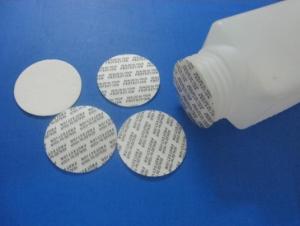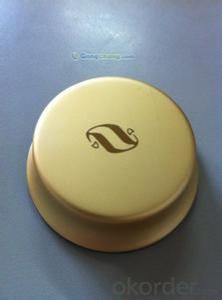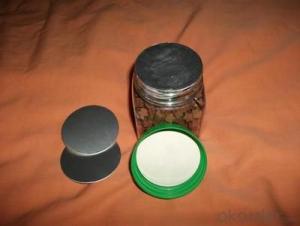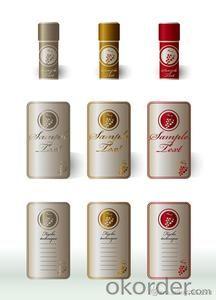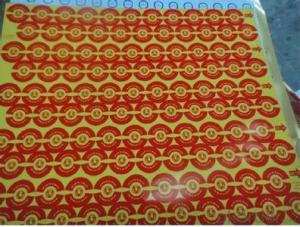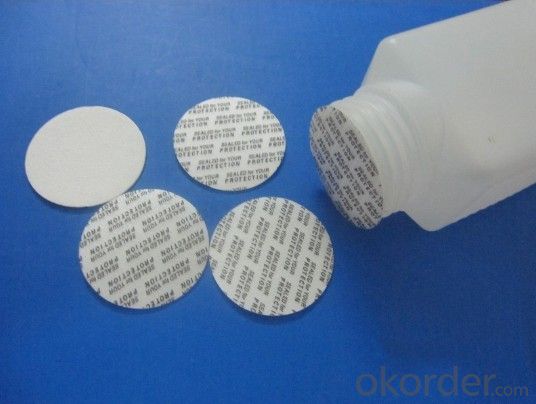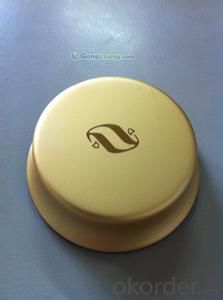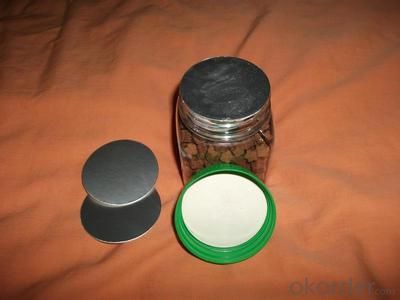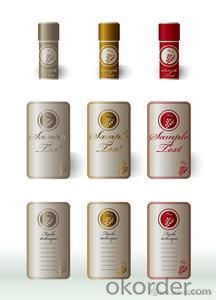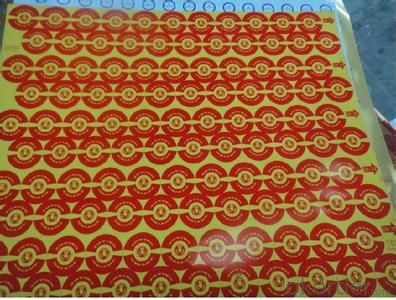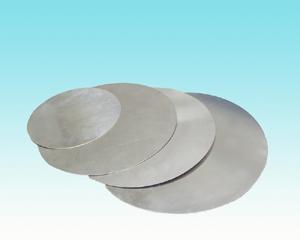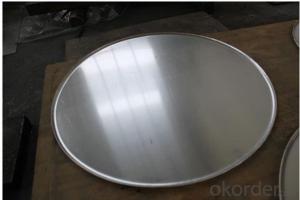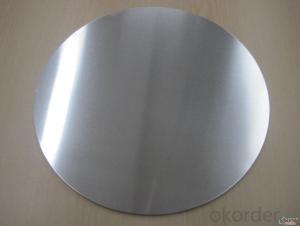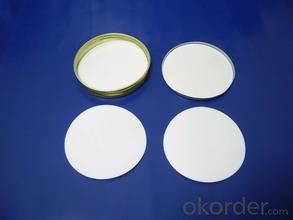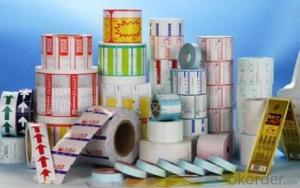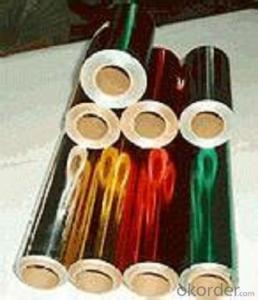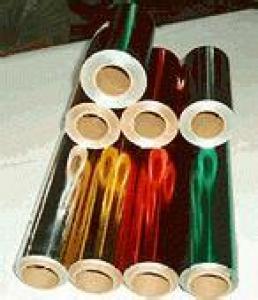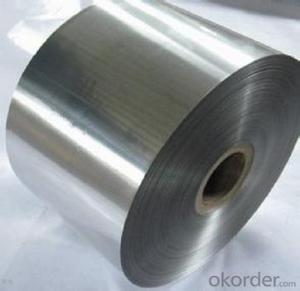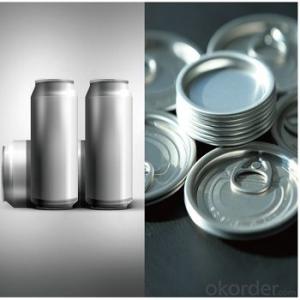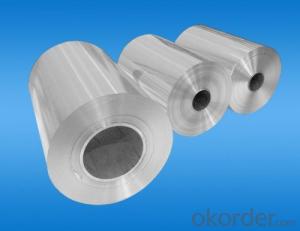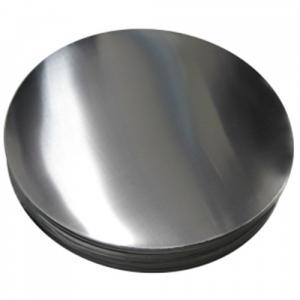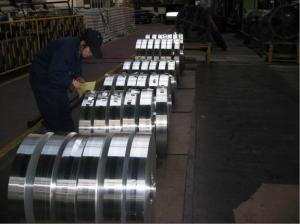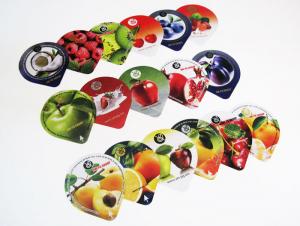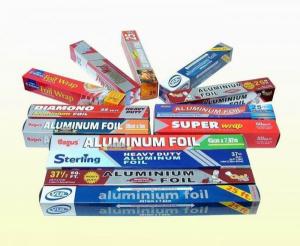Aluminum Foil Wine Bottle Caps in Various Colors
- Loading Port:
- Shanghai
- Payment Terms:
- TT or LC
- Min Order Qty:
- 1000 pc
- Supply Capability:
- 100000 pc/month
OKorder Service Pledge
OKorder Financial Service
You Might Also Like
Aluminum Foil for Bottle Caps (Various Colors)
Product Description:
Caps are an important part of food and beverage packaging, but also the first place where consumers contact the product. Bottle caps can keep the content product sealed and also have security and safety functions. They are widely used in bottled products, so the bottle cap for food, beverage industry, wine, chemical industry, pharmaceutical industry, the upstream industry is bottle packaging containers of key products.
Bottle cap products occupy a key position in the packaging industry, so the development trend of the industry will have a direct impact on the demand for the product. In recent years, the cap product market demand is stable and showed the trend of the development of the, except for the use of the packaging material changes, relative to the cap, arising from changes in the production structure of the species; the whole will improve ratio of plasticity and the use of cover. Although there are some parts of the aluminum cover to replace the plastic cover, but mainly used in wine and functional drinks, the demand for a stable growth, while the demand of the claw cover is greater than the change.
Product Advantages:
Product Applications:
Packaging:
Packaging Details: 520X370X315mm; 1414/Box; 650,000pcs/1X20'; 1,350,000pcs/1X40'
Delivery Detail: 4 days with Aluminum foil bottle caps
Product Specifications:
Aluminum foil wine bottle caps Novel style, color is complete.
Product Images:
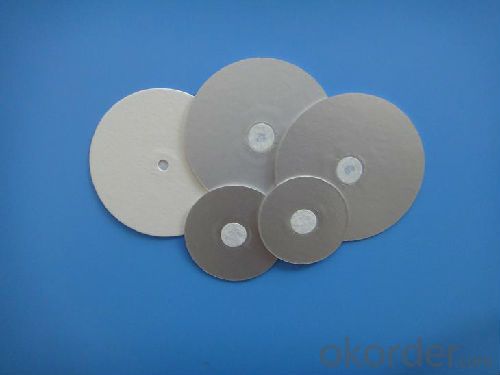
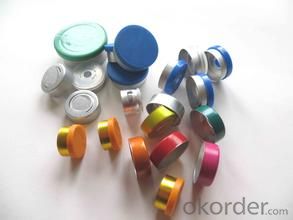
FAQ:
Q1: Why buy Materials & Equipment from OKorder.com?
A1: All products offered by OKorder.com are carefully selected from China's most reliable manufacturing enterprises. Through its ISO certifications, OKorder.com adheres to the highest standards and a commitment to supply chain safety and customer satisfaction.
Q2: How do we guarantee the quality of our products?
A2: We have established an advanced quality management system which conducts strict quality tests at every step, from raw materials to the final product. At the same time, we provide extensive follow-up service assurances as required.
- Q: This question asks for methods to effectively clean aluminum surfaces without causing damage.
- <p>To clean aluminum surfaces effectively, use a mild detergent and warm water. Mix a few drops of dish soap with water in a bucket. Dip a soft cloth or sponge into the solution and gently wipe the aluminum surface. Avoid using abrasive materials or harsh chemicals, as they can scratch the surface. After cleaning, rinse with water and dry thoroughly to prevent water spots. For stubborn stains, use a non-abrasive cleaner specifically designed for aluminum. Regular cleaning will help maintain the surface's appearance and prevent corrosion.</p>
- Q: Is it safe and common to use aluminum for the production of containers for food and beverages?
- <p>Yes, aluminum is commonly used to make containers for food and beverages. It is lightweight, durable, and provides excellent resistance to corrosion. Aluminum cans are widely used for beverages like soda and beer, and aluminum foil is often used for food packaging. However, it's important to note that the interior of aluminum cans is usually lined with a protective coating to prevent direct contact with the food or drink, which can help to mitigate any potential health concerns related to aluminum exposure.</p>
- Q: Is it possible for aluminum to penetrate the skin and be absorbed into the body?
- <p>Aluminum can be absorbed through the skin, but the rate and extent of absorption are generally low. The skin acts as a barrier and only allows minimal absorption of aluminum. Most aluminum exposure comes from ingestion, not dermal absorption. The body's ability to absorb aluminum can be influenced by factors such as the form of aluminum, the condition of the skin, and the duration of exposure. However, it's important to note that aluminum is commonly found in everyday products and is generally considered safe in the amounts typically encountered.</p>
- Q: This question asks about the health effects of consuming aluminum on human health.
- <p>Aluminum consumption can have various effects on human health, though the extent of its impact is still a subject of debate among researchers. High levels of aluminum intake have been associated with neurological disorders, particularly Alzheimer's disease, although a direct causal link has not been definitively established. Aluminum can also interfere with bone health, potentially leading to osteoporosis, and may affect the kidneys, causing dysfunction. It is important to note that the human body naturally excretes aluminum, so moderate exposure is generally not harmful. However, excessive intake, especially over a long period, could pose health risks.</p>
- Q: Is it feasible to use pure aluminum for the production of coins or medals that maintain their longevity and aesthetics?
- <p>While pure aluminum is lightweight and corrosion-resistant, it is not typically used for making coins or medals due to its low melting point and softness. Coins and medals often require materials that are harder and more durable to withstand wear and tear over time. Additionally, pure aluminum is less visually appealing as it does not have the luster or reflective qualities of other metals like silver or gold. Alloys are generally preferred for coinage and medals because they offer better durability, resistance to wear, and can be tailored to have specific properties like hardness and resistance to corrosion.</p>
- Q: This question asks about the methods used to determine the hardness of aluminum material.
- <p>The hardness of aluminum can be measured using various standardized tests. The most common methods include the Brinell Hardness Test, where a hard steel or carbide ball is pressed into the aluminum surface, and the Vickers Hardness Test, which uses a diamond pyramid indenter. The Rockwell Hardness Test is also used, applying a diamond cone or steel ball to the surface. The hardness is quantified by the depth of the indentation, and the results are expressed in specific hardness units like BHN (Brinell Hardness Number), HV (Vickers Hardness), or HR (Rockwell Hardness). These tests provide a measure of the material's resistance to deformation, which is crucial for applications requiring strength and durability.</p>
- Q: What are the differences between Aluminum Oxide and Aluminum Alloy in terms of their properties and applications?
- <p>Aluminum Oxide and Aluminum Alloy are distinct materials with different properties and uses. Aluminum Oxide, also known as alumina, is a ceramic material with a high melting point, hardness, and electrical insulation properties. It's used in abrasives, electronics, and as a refractory material. In contrast, Aluminum Alloys are composites of aluminum with other elements like copper, magnesium, or silicon, which enhance their strength, corrosion resistance, and malleability. They are widely used in construction, automotive, aerospace, and packaging due to their lightweight and durability.</p>
- Q: Describe the reaction of aluminum with acids and bases.
- <p>Aluminum reacts differently with acids and bases. With acids, aluminum undergoes a redox reaction where it loses electrons and forms Al^3+ ions. This reaction is exothermic and releases hydrogen gas. The general reaction with a non-oxidizing acid like hydrochloric acid is: 2Al + 6HCl 鈫?2AlCl鈧?+ 3H鈧? In the presence of a strong base, aluminum reacts with water to form aluminate ions and hydrogen gas, a process known as an alkaline hydrolysis. The reaction can be represented as: 2Al + 2OH鈦?+ 6H鈧侽 鈫?2Al(OH)鈧勨伝 + 3H鈧?</p>
- Q: Is aluminum a suitable material for manufacturing solar panels?
- <p>Yes, aluminum is commonly used in the manufacturing of solar panels. It is utilized primarily for the frame of the solar panel, providing structural support and protection. Aluminum is chosen for its lightweight, high strength, and corrosion resistance, which are ideal properties for outdoor applications like solar panels. It also helps in heat dissipation, which is beneficial for maintaining the panels' efficiency. While aluminum is not used in the actual photovoltaic cells, its role in the panel's construction is significant.</p>
- Q: This question asks about the energy savings achieved by utilizing recycled aluminum compared to producing new aluminum.
- <p>Using recycled aluminum saves a significant amount of energy. It requires only 5% of the energy needed to produce new aluminum from raw materials. This is because recycling aluminum involves melting the metal, which is much less energy-intensive than the mining, refining, and electrolysis processes required for new aluminum production. By recycling aluminum, we can save up to 95% of the energy that would be used in the production of new aluminum.</p>
Send your message to us
Aluminum Foil Wine Bottle Caps in Various Colors
- Loading Port:
- Shanghai
- Payment Terms:
- TT or LC
- Min Order Qty:
- 1000 pc
- Supply Capability:
- 100000 pc/month
OKorder Service Pledge
OKorder Financial Service
Similar products
Hot products
Hot Searches
Related keywords
